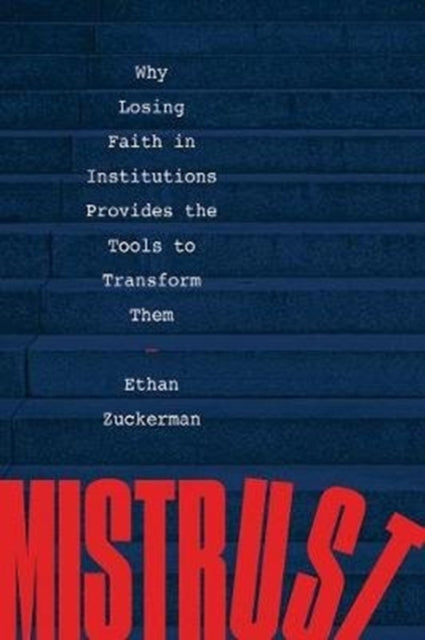Ethan Zuckerman
Mistrust: Why Losing Faith in Institutions Provides the Tools to Transform Them
Mistrust: Why Losing Faith in Institutions Provides the Tools to Transform Them
YOU SAVE £3.51
- Condition: Brand new
- UK Delivery times: Usually arrives within 2 - 3 working days
- UK Shipping: Fee starts at £2.39. Subject to product weight & dimension
Bulk ordering. Want 15 or more copies? Get a personalised quote and bigger discounts. Learn more about bulk orders.
Couldn't load pickup availability
- More about Mistrust: Why Losing Faith in Institutions Provides the Tools to Transform Them
Citizens of democracies worldwide are losing confidence in the system, and this loss of faith has spread beyond government to infect institutions such as the press, corporations, and digital platforms. Ethan Zuckerman offers a lens for understanding civic engagement that focuses on efficacy and the power of seeing the change you make in the world.
Format: Hardback
Length: 304 pages
Publication date: 30 March 2021
Publisher: WW Norton & Co
Citizens of democratic societies worldwide are losing faith in the system, from the Tea Party to Occupy Wall Street, and from cryptocurrency advocates to the #MeToo movement. This loss of faith has spread beyond government to infect a broad swath of institutions, including the press, corporations, and digital platforms, none of which seem capable of holding us together. How should we encourage participation in public life when neither elections nor protests feel like paths to change?
Drawing on work by political scientists, legal theorists, and activists on the streets, Ethan Zuckerman offers a lens for understanding civic engagement that focuses on efficacy, the power of seeing the change you make in the world. Mistrust is a guidebook for those looking for new ways to make change as well as a fascinating explanation of how we've arrived at a moment where old ways of engagement are failing us.
The decline of trust in institutions is a global phenomenon, affecting both developed and developing countries. In the United States, for example, trust in the government, the media, and the financial sector has been declining for decades, leading to a sense of disillusionment and disengagement among citizens.
One reason for this decline in trust is the increasing complexity of modern society. With the rise of technology and globalization, institutions have become more complex and opaque, making it difficult for citizens to understand how they operate and what they are responsible for. This complexity has also created new opportunities for corruption and abuse, which further erodes trust in institutions.
Another factor contributing to the decline of trust is the growing sense of inequality in society. As income and wealth continue to be concentrated in the hands of a few, many people feel that their voices are not being heard and that their interests are not being represented by the institutions that are supposed to serve them. This sense of inequality can lead to a lack of faith in the system and a willingness to engage in alternative forms of activism and protest.
Despite these challenges, there are still ways to encourage participation in public life and rebuild trust in institutions. One approach is to focus on building more transparent and accountable institutions. This can be done by implementing policies that promote greater disclosure of information, greater participation in decision-making processes, and greater accountability for those who hold power.
Another approach is to promote greater civic education and engagement. This can be done by providing opportunities for citizens to learn about the institutions that govern their lives and to participate in decision-making processes. This can include initiatives such as community-based education programs, public forums, and online platforms that allow citizens to share their ideas and opinions.
Finally, it is important to address the underlying social and economic issues that contribute to the decline of trust in institutions. This can include policies that promote greater economic equality, reduce income inequality, and provide social safety nets for those who are most vulnerable. By addressing these underlying issues, we can create a more just and equitable society that is more likely to trust in its institutions.
In conclusion, the decline of trust in institutions is a complex and challenging problem that requires a multifaceted approach. By focusing on building more transparent and accountable institutions, promoting greater civic education and engagement, and addressing the underlying social and economic issues, we can work towards rebuilding trust in our institutions and creating a more just and equitable society.
Weight: 572g
Dimension: 165 x 246 x 30 (mm)
ISBN-13: 9781324002604
This item can be found in:
UK and International shipping information
UK and International shipping information
UK Delivery and returns information:
- Delivery within 2 - 3 days when ordering in the UK.
- Shipping fee for UK customers from £2.39. Fully tracked shipping service available.
- Returns policy: Return within 30 days of receipt for full refund.
International deliveries:
Shulph Ink now ships to Australia, Belgium, Canada, France, Germany, Ireland, Italy, India, Luxembourg Saudi Arabia, Singapore, Spain, Netherlands, New Zealand, United Arab Emirates, United States of America.
- Delivery times: within 5 - 10 days for international orders.
- Shipping fee: charges vary for overseas orders. Only tracked services are available for most international orders. Some countries have untracked shipping options.
- Customs charges: If ordering to addresses outside the United Kingdom, you may or may not incur additional customs and duties fees during local delivery.


